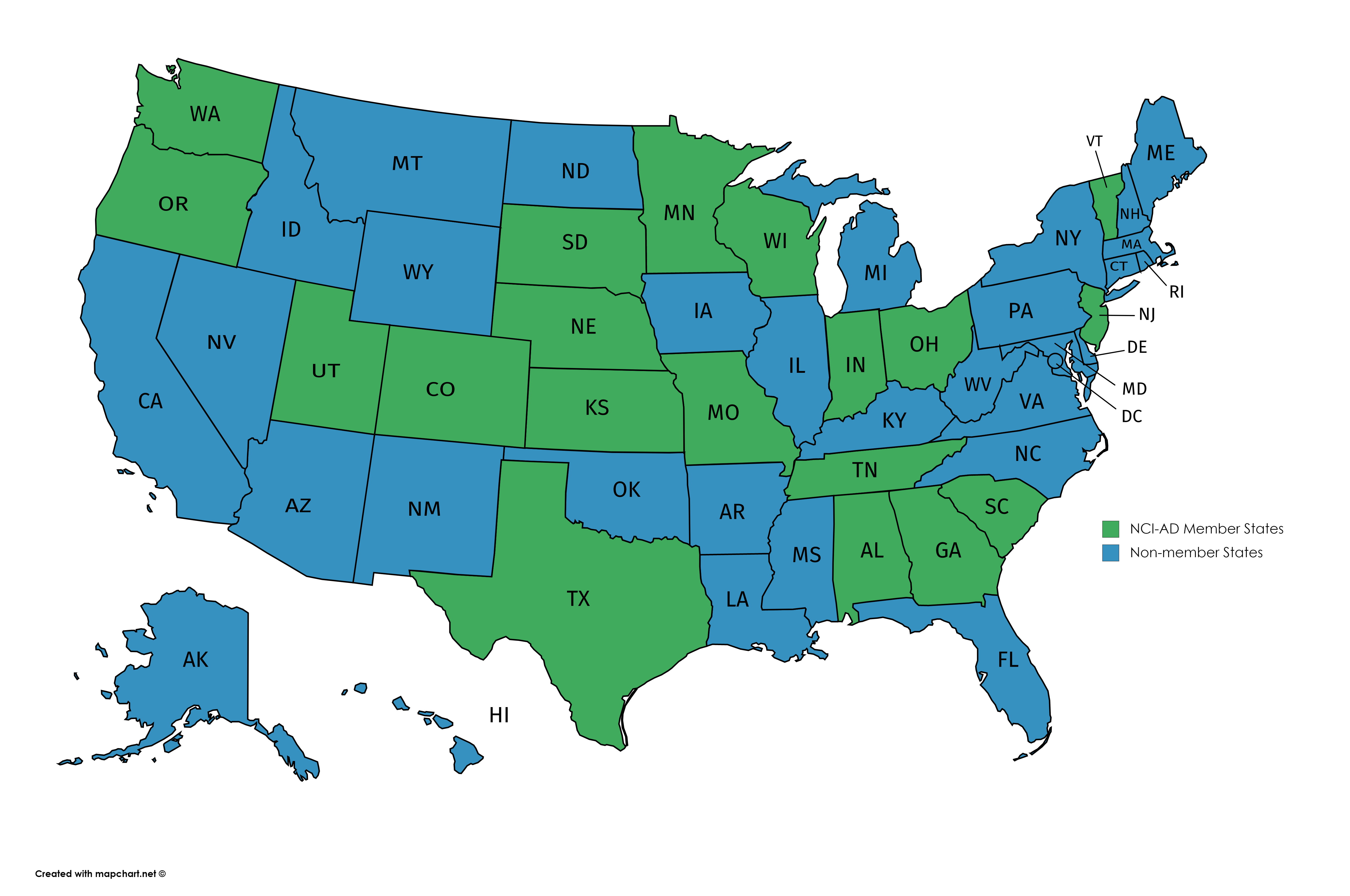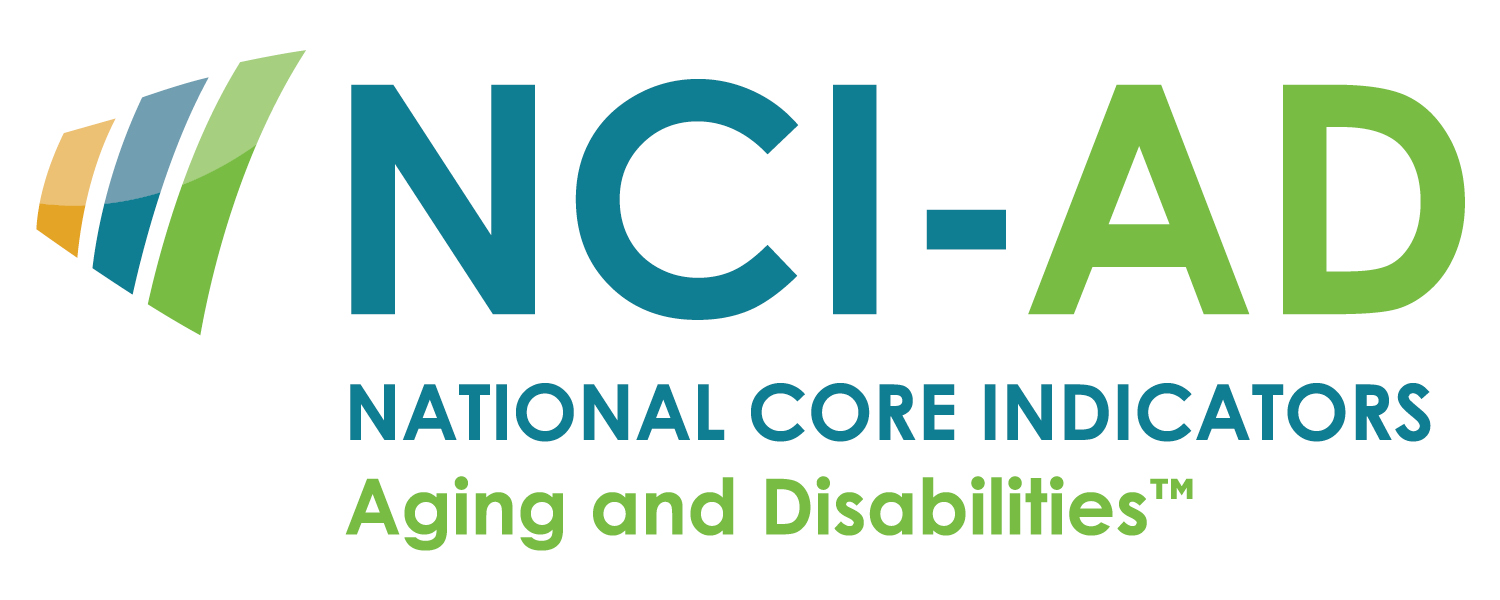Visit our website: nci-ad.org
Overview
The National Core Indicators-Aging and Disabilities (NCI-AD™) is an initiative designed to support states’ interest in assessing the performance of their long-term services and supports (LTSS) programs and delivery systems in order to improve services for older adults and people with physical disabilities. NCI-AD is a collaborative effort between ADvancing States and the Human Services Research Institute (HSRI). NCI-AD’s primary aim is to collect and maintain valid and reliable data that give states a broad view of how publicly-funded LTSS services impact outcomes and quality of life.
Data collected for the NCI-AD project provide valuable insight and context to the field of aging and disability services through the development of indicators and measures that assess quality of life, community integration, and person-centered services. NCI-AD assesses outcomes beyond health and safety to address important long-recognized gaps in LTSS data, such as social, community, and person-centered goals.
Data for the project are gathered through annual in-person surveys administered by state agencies to a sample of at least 400 older adults and individuals with physical disabilities accessing publicly-funded LTSS programs. States work with ADvancing States and HSRI to determine a survey sample population from programs with a variety of funding sources, including skilled nursing facilities, Medicaid waivers, Medicaid state plans, state-funded programs, and Older Americans Act programs. The survey instrument includes a background survey, which gathers data about the individual from agency records, and an in-person survey, which includes subjective, satisfaction-related questions that can only be answered by the individual, and objective questions that can be answered by the individual or, if needed, their proxy. The NCI-AD Project Team interprets each state's data and produces state-specific reports that can support state efforts to strengthen LTSS policy, inform quality improvement activities, and compare their performance with national data. State and national reports are made publicly available on the NCI-AD website here.
The data collection cycle for the project runs June 1 to May 31 each year. States interested in learning more are encouraged to contact ADvancing States’s NCI-AD Director, Rosa Plasencia.
2018-19 Survey Year & Project History
NCI-AD officially launched on June 1, 2015, with 13 participating states. Since then, the project has grown to 19 participating states in the 2018-19 NCI-AD year, as shown by the green states in the map below.

History
The National Core Indicators-Aging and Disabilities (NCI-AD) project grew out of state aging and disabilities agencies’ desire for quantifiable data on the performance of their publicly-funded long-term services and supports (LTSS) programs for older adults and individuals with physical disabilities. Such data have been available for states’ intellectual/developmental disabilities (I/DD) service systems through the National Core Indicators (NCI) project for the past 21 years. NCI-AD is designed to assess the performance of state LTSS programs for older adults and people with physical disabilities by collecting and maintaining valid and reliable data on quality of life and outcomes.
In 2012, ADvancing States began working in collaboration with Human Services Research Institute (HSRI), as well as the National Association of State Directors of Developmental Disabilities Services (NASDDDS) to develop the NCI-AD Consumer Survey.
ADvancing States’s Board of Directors voted to begin work on the NCI-AD project in late 2012. In June 2013, ADvancing States and HSRI, with help from the NCI-AD steering committee (comprised of ADvancing States board members) and NASDDDS, began amending the Adult Consumer Survey portion of the NCI tool to better align with the priorities of aging and disability services and systems. By the end of 2013, the initial survey draft had been revised seven times, based on feedback gathered from the steering committee, stakeholder groups, national-level partners, subject-matter experts, and focus groups (comprised of older adults and individuals with physical disabilities being served by their state systems). A pre-pilot test was also conducted with service participants in Maine.
In 2014, Georgia, Minnesota, and Ohio piloted the NCI-AD Consumer Survey and finished data collection in the same year. The NCI-AD Project team compiled data from the three pilot states in the NCI-AD Final Pilot Results report.
ADvancing States, HSRI, and the NCI-AD Steering Committee worked with stakeholders to revise the survey based on the pilot experience. In January 2015, the project team conducted a small sample pilot of the revised survey with participants in Georgia. The survey was revised again based on this pilot and finalized in March 2015.
Development of the NCI-AD tool was supported by ADvancing States members and the Administration for Community Living (ACL).
For more information, please contact Rosa Plasencia, NCI-AD Project Director.

